The beauty of language lies not just in its formal structure but in the colloquial phrases and slang that give it color, context, and cultural relevance. This unique blend of words and expressions crafts an intimate sense of community – a linguistic home, if you will – and Italian-Americans know this very well.
Many Italian-American words have their roots in Italian dialects introduced to the United States by immigrants. Over time, these words have undergone an American transformation, and looking at the interplay between the two languages as they foster a sense of community and identity is truly fascinating.
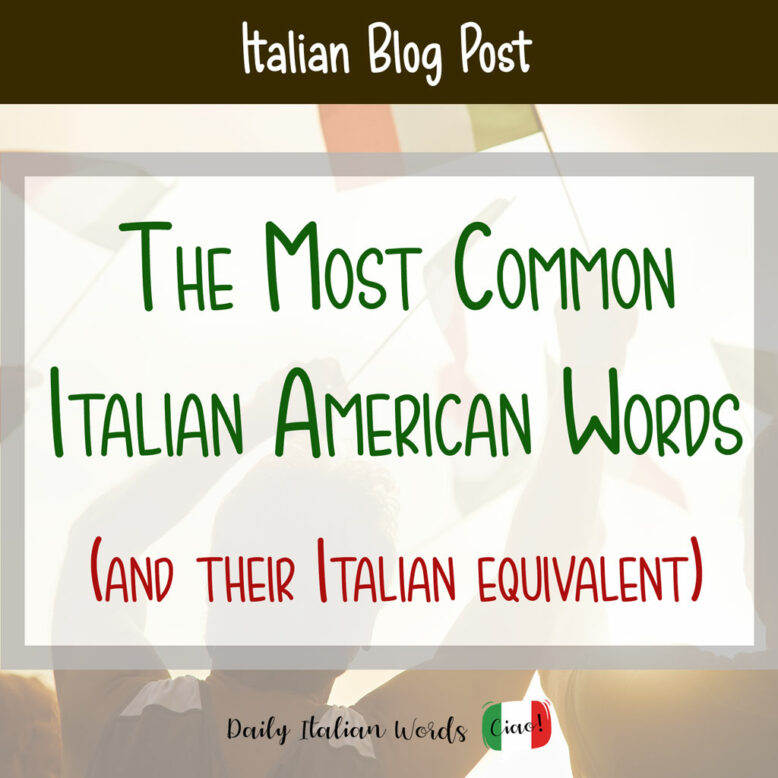
The origins of Italian-American dialect
The Italian-American dialect comes from a rich, complex history of immigration and culture assimilation that goes back to the 19th and 20th centuries. During those years, many Italians, especially those from the southern regions, crossed the Atlantic looking for better opportunities and a chance to live the American dream.
Once they hit the American soil, they continued to speak their native language and regional dialects like a comforting piece of home, but at the same time they also had to adapt and integrate into the English-speaking society. As a result, words were coined, borrowed, and adapted, creating a unique linguistic fusion.
Today, Italian-Americans keep this language blend alive, chatting in this special mix within their families and close-knit communities. So, let’s see some examples of the most popular Italian-American words.
Common Italian-American Words in Food and Cuisine
One can’t really talk about Italian American words without starting from food, right? Food is the heart and soul of Italian American culture, and it serves as an important means through which Italian traditions and language are kept alive and well in the US.
Bisgott’
[beesh-GAWT]
The Italian equivalent is biscotto
The perfect companion to your coffee, bisgott’ are a type of crunchy cookie.

Brosciutt’ / Prozhoot
[BRAAJH-oot]/[PRAAJH-oot]
The Italian equivalent is prosciutto
Thin slices of ham perfect for charcuterie boards or sandwiches.

Calamad
[caal-uh-MAAD]
The Italian equivalent is calamari.
These are fried squid, a staple in coastal Italian cuisine.
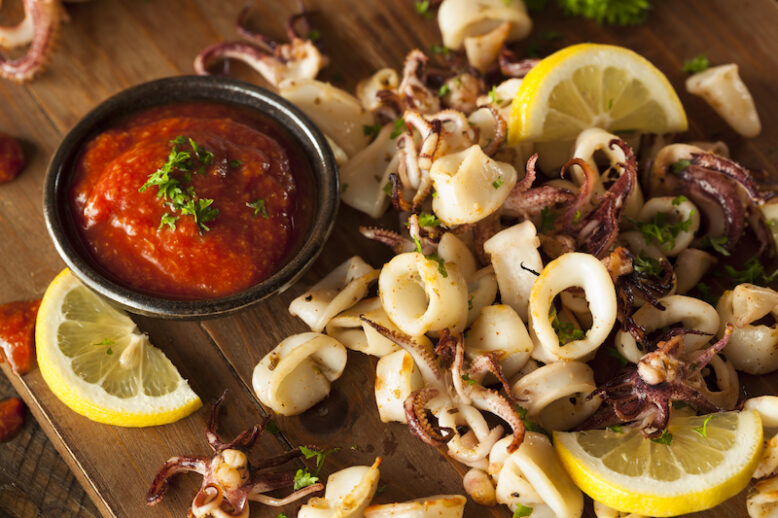
Fajool
[Fah-JOOL]
From the Italian fagioli.
These are the humble beans, which add both flavour and nutrition to many rustic Italian dishes.

Gabagool
[gaa-baa-GOOL]
The Italian equivalent is capocollo.
A traditional cold cut from Southern Italy that stands out in any Italian deli selection.
Ganol’
[gaa-NOAWL]
The Italian equivalent is cannoli.
The decadent Sicilian pastries filled with sweetened ricotta cheese and adorned with chocolate chips or candied fruit.

Manigott’
[maa-NEE-gauwt]
From the Italian manicotti.
Large pasta tubes to fill with cheese and sauce, the epitome of Italian comfort food!
Muzzarell’ / Muzzadell’
[mootz-aa-DELL]
The Italian equivalent is mozzarella
Whether melted on a pizza or enjoyed fresh with tomatoes and basil, muzzarell’ is the epitome of Italianness!

Rigott’
[ree-GAUWT]
The Italian equivalent is ricotta.
The farmers-style whey cheese that elevates both savoury dishes and sweet desserts.
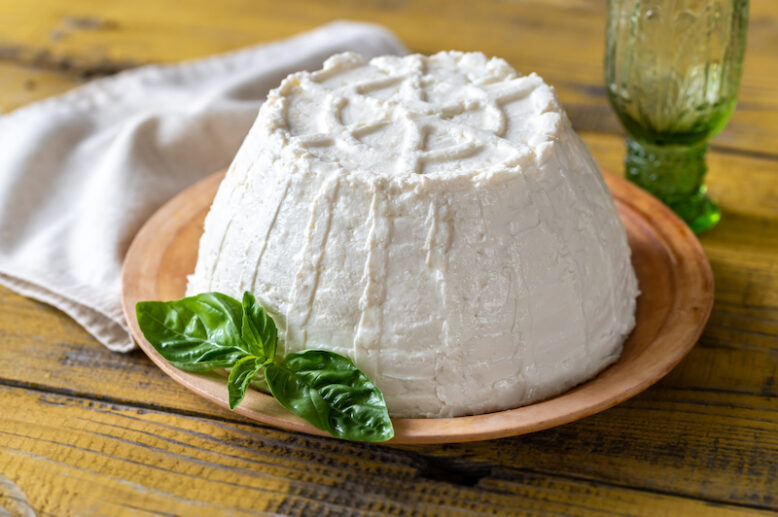
Soopersahd
[Soo-per-sahd]
The Italian equivalent is soppressata.
A delicious cured meat with a distinct flattened shape.
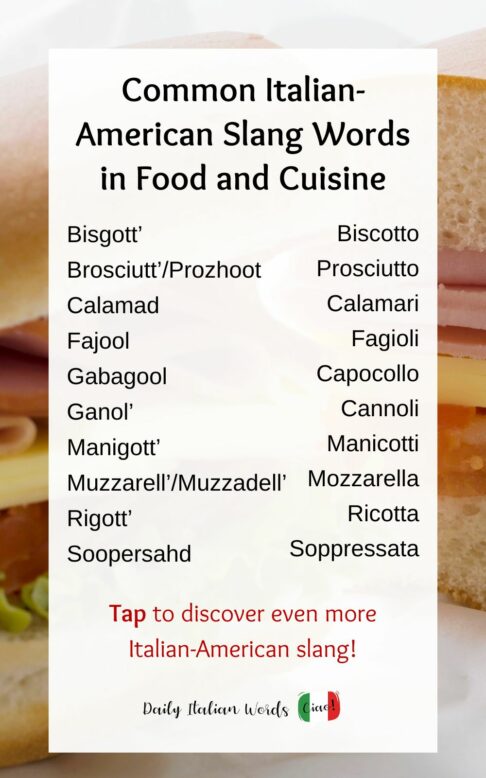
Italian-American words to talk about people
Here are some Italian-American words and expressions used to talk about individuals, their traits and characteristics.
Aduzipach / Aduzipazz
[aa-DOO-zee-PAACH]/[aa-DOO-zee-PAATS]
The Italian equivalent is ma tu sei pazzo.
An exclamation, essentially meaning “you’re crazy.”

Bicciuridu / Bicciurida
[BEECH-oo-REE-doo] / [BEECH-oo-REE-daa]
The Italian equivalent is picciriddo / picciridda
This is an endearing term used for children, meaning “my little boy” / “my little girl”.

Cabbadost
[Kab-uh-dost]
The Italian equivalent is capa tosta.
Translating to “stubborn” or “hard-headed,” it points out someone’s persistent or obstinate nature. Note that in standard Italian, you are more likely to hear testa dura (hard head) or testardo (stubborn).

Cugine
[Koo-jeen]
The Italian equivalent is cugino.
Although cugino literally means “cousin” in Italian, in Italian-American slang, the term is often used to refer to an Italian-American man.
Disgraziat’
[dees-graats-ee-AAT]
The Italian equivalent is disgraziato.
This term is used to say someone is disgraced or has fallen from grace, often due to their own actions.

Facciabrutt’
[FA-chuh-broot]
The Italian equivalent is brutta faccia.
The term “facciabrutt'” literally translates to “ugly face” and it’s a colloquial expression in Italian-American communities to denote someone who is unpleasant.

Fratu
[FRAA-too]
From the Italian fratello.
Literally meaning “brother,” fratu emphasizes a close bond and can refer both to a biological sibling and a close friend.

Gavone
[gaa-VOWN]
The Italian equivalent is cafone.
Gavone is used with the meaning gluttonous, referring to someone who eats way too much.
Ghiacchieron
[gyaa-kyaa-ROAN]
The Italian equivalent is chiacchierone.
This term refers to a person who talks too much or can’t keep a secret, essentially a blabbermouth or big mouth.

Gidrul’
[jih-DROOL]
The Italian equivalent is citrullo.
A derogatory expression meaning a stupid or foolish person.
Goombah
[goom-BAH]
The Italian equivalent is compare.
A close friend, often used to denote someone who is more like family than a simple friend.
Goomahd
[ˈguːmæd]
The Italian equivalent is comare.
The Italian word comare traditionally means “godmother,” but in Italian-American slang this word is used more loosely to refer to a female friend.

Guacarunno
[gwaa-kaa-ROO-no]
The Italian equivalent is qualcuno.
This term means “someone” and is used to identify an unspecified person.
Idu
[EE-doo]
From the Sicilian dialect iddu
A term meaning “he” in English, often used in dialectical Italian and Italian-American communities.
Ida
[EE-daa]
From the Sicilian dialect idda
Similar to “Idu,” this term means “she” in English
Mamaluke
[maa-maa-LOUK]
The Italian equivalent is mammalucco.
Someone who acts foolishly or stupidly.
Paesan’
[pai-ZAAN]
The Italian equivalent is paesano.
In Italian, paesano refers to someone from the same village or country. In Italian-American slang, it’s a friendly way to refer to another Italian.
Scustumad’
[SKOO-STOO-MAHD]
The Italian equivalent is scostumato.
Similar to “Gidrul’”, this is another term for a stupid or foolish person.
Stunad
[stoo-NAAD]
From the Italian stonato.
This is used to describe someone as a moron or idiot. The standard Italian word means off-key, tone-deaf or dazed.
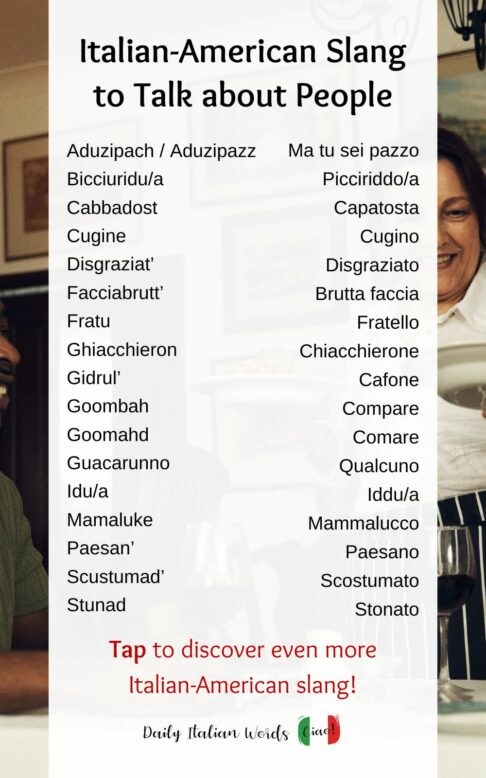
Miscellaneous Italian-American words
Now let’s explore some commonly used Italian-American slang words and expressions that serve various functions in everyday language.
Ammonini
[aa-moe-NEE-nee]
From the Sicilian dialect amunì
When you say Ammonini, you’re saying you’re ready to go (‘Let’s go!’).

Ashpett
[Ahsh-pet]
The Italian equivalent is aspetta.
Meaning “wait,” it’s used to tell someone to hold on or pause for a moment.

Aunda
[aa-WOON-duh]
The Italian equivalent is dove.
Literally meaning “where?” or “where is it?”, this is a slang expression to ask for the location of something or someone.
Bisinisse
[Bee-see-nees-seh]
From the English business.
This term serves the same general function as the standard term “business” – it just adds a playful twist in pronunciation.
Capeesh
[kuh-peesh]
The Italian equivalent is capisci.
This is a very famous Italian-American slang word used to ask someone if they understand something (‘you know what I mean?’).
Ghistu
[GEE-stoo]
The Italian equivalent is questo.
It indicates “this”, referring to something specific.
Keh Sa Deech?
[keh see dee-chay]
The Italian equivalent is Che si dice?
A colloquial way of asking someone “What’s up?”

Mala testa
[Mah-lah Teh-stah]
The Italian equivalent is mal di testa.
This term translates to “headache” and is used to describe both physical discomfort or metaphorically to refer to a problematic situation.

Maron’
[maa-ROAN]
The Italian equivalent is madonna.
Referring to the Virgin Mary, this is a popular exclamation to express surprise, disbelief or frustration, equivalent to saying “Oh my God” or “Damn it.”
Mooshad
[moo-SHYADD]
The Italian equivalent is moscio.
This term refers to something that is limp, flabby, or lacking firmness. In some Italian-American dialects, it’s also used to describe someone who is weak or lacks backbone.
Naboleedahn
[Nah-bo-lee-dahn]
The Italian equivalent is napoletano.
It refers to people from Naples or the dialect and culture of that region.
Oobatz / Patz
[oo-BAATZ]
The Italian equivalent is pazzo.
Oobatz is the Italian-American slang word for “crazy”.

Orrioppo
[Oh-ree-OP-po]
From the English hurry up.
This term mimics the sound of “hurry up” and the meaning is rather self-explanatory, urging someone to move faster (Sbrigati! in Italian).

Shangad
[SH-ON-GOD]
The Italian equivalent is sciancato
It’s used to described someone or something that’s all messed up.
Salud’
[zaa-LOOD]
The Italian equivalent is salute
Literally meaning “health”, salud’ is commonly used as a toast before drinking and to wish someone good health.

Shkeeve
[shkeef]
The Italian equivalent is schifo
This describes something that makes one feel disgusted and literally means “disgust” or “revulsion.”

Spustad
[spoo-STAAD]
The Italian equivalent is spostati
Meaning “move over” or “move yourself”, this is often used to tell someone to make space.
Statazit
[STA-ta-ZEET]
The Italian equivalent is stai zitto
Statazit means “shut up” and is used to tell someone to stop talking.

Un ada oda
[oon-AA-daa-O-daa]
The Italian equivalent is un’altra volta
This expression indicates that you will do something “another time”.
Vascinga mascina / vachiuma clina
[Vah-seen-gah Mah-shee-nah] [Vah-kyoo-mah Klee-nah]
From the English washing machine / vacuum cleaner
These are two amusing Italian-American slang words related to household chores: the first refers to the washing machine (known as lavatrice in Italian), while the second refers to the vacuum cleaner (or aspirapolvere in Italian).
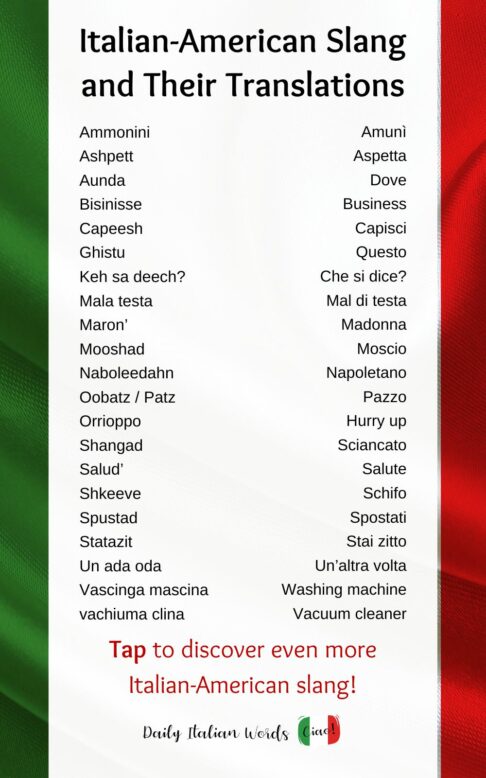
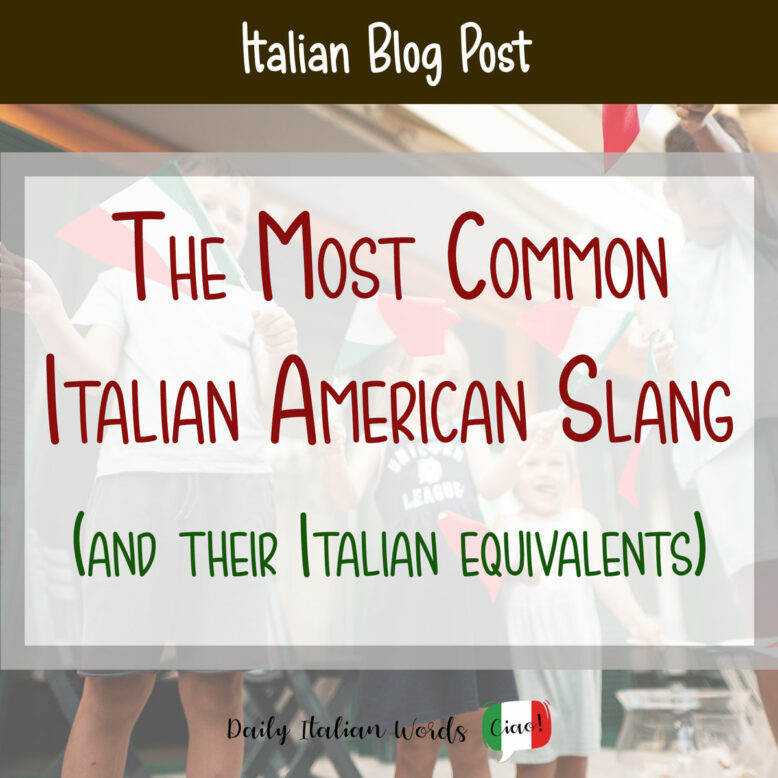

Valentina Nicastro is a travel writer in love with her home country, Italy. Having travelled widely around the globe, she realised there was more to explore closer to home and decided to put the passport aside for a while. When she is not immersed in documenting Italy, you’ll find her donning her communication consultant hat, weaving words as a content writer and bridging linguistic divides as a translator.


